The answer is YES! Welcome to HB..X?

With platforms like edX, online learning is becoming more and more common. For HBS, however, this was not enough. With the launch of their digital initiative … did they just happen to invent the classrooms of the future?
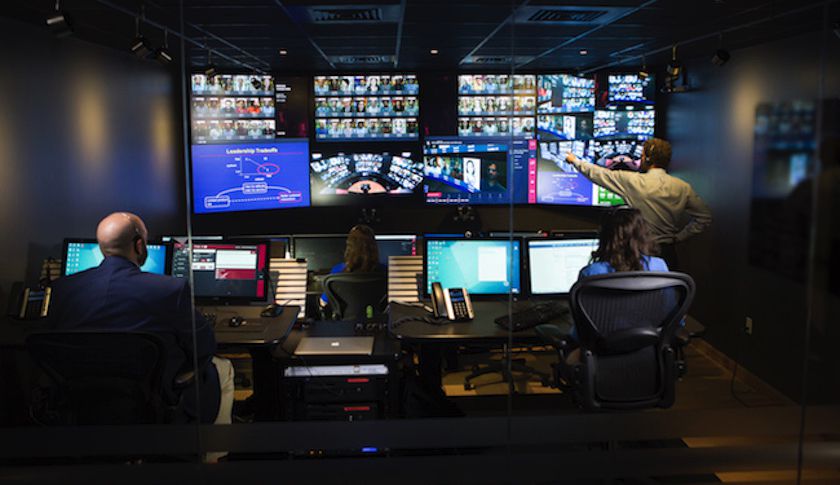 Welcome to HBX !
Welcome to HBX !
Whether it is through CORe or -in my case- a Disruptive Strategy course with Professor Clayton Christensen -architect of and the world’s foremost authority on disruptive innovation- it is very unlikely that you’ll encounter a learning experience as unique as the one Harvard Business School has been able to orchestrate at HBX.
Three years ago in an interview with Jeff Howe at Wired, professor Christensen stated that Higher Education was at the top of his list of industries that were soon to be in a stage of disruption crisis [1]
The reason? Increasing availability of ivy-caliber higher education —-> at half the price!
On the verge of disruption Harvard Business School decided to undertake its digital learning initiative: a platform that would enable them to use technology as a tool to expand on their fundamental pillar to educate leaders who would make a difference in the world while recreating the unique HBS learning experience and the worldwide practice approach to b-education : the case method!
The new operating model
In order to replicate the HBS signature experience in their online platform, careful thought was given to take advantage of the full potential that digitalisation had to offer and how it could be best implemented on this initiative.
First of all, they created a similar application process. Unlike other online courses which are either free or available -at cost- to anyone willing to pay, HBX courses are only accessible if you are granted a spot! Among the different application requirements, you have to articulate how you expect to contribute to the cohort and the course. Sounds familiar?
Once you are in, content delivery begins!
“The aspirations Harvard Business School sought to address when the case method was developed more than 100 years ago would appear to be just as strong in their new online reincarnation” Emma Simmons [2]
If you ask me, this is where they really got it right! One of the main challenges to replicate the class discussion was overcoming the asynchronicity inherent to the online learning model… so they developed content that -although self paced- had a particular set of characteristics[3]:
1. Content is available at specific set dates, not all at once. It includes videos, interactive graphs and exercises. All video content, of course, delivered by HBS faculty.
2. You cannot advance in a module until you go through all the content. How do they make sure that you do? you guessed it !! COLD CALLS, polls and trigger questions spread throughout every module, which are available for all the Cohort to read and comment[4]. This also reinforces class participation, one of the most distinctive aspects of the HBS learning experience.
3. You do quizzes at the end of each module
… And if the uniqueness of the course structure was not convincing enough for you, lets talk about the platform itself.
The “Dashboard” was designed to enable interaction between cohort participants, enabling them to learn about their background and location as well as giving them various communication tools within the platform[5]. It invites people to share, engage, debate and network. It is also well structured so all group assignments are completed in an interactive way.
The final touch: HBX Live !
This is the ultimate collaborative online learning setup. Yes, it requires a certain degree of synchronicity, but the more I stare at this picture the more it resembles my beloved♥ Aldrich 9 classroom. 60 people located all over the globe engaged in an active learning environment, much like what we experience here on a daily basis.
Currently, HBX live sessions take place once or twice throughout the course and only 60 people can participate at any given time. The 900+ rest of the cohort can, however, be part of the conversation via chat and live streaming[6][7].
What next?
Although HBS has accomplished great things with the digital learning initiative, there is still many ways in which they can integrate transformations into their business model.
My recommendation moving forward would be
- Trying to increase the HBX live sessions offered in the Cohorts
- Develop a hybrid model in which full time MBA students are also exposed to this online platform – not just pre MBA CORe
- Resist the idea of developing an online MBA until they can guarantee that they are delivering on every aspect that makes Harvard Business School unique.
word count: 729
- https://www.wired.com/2013/02/mf-clayton-christensen-wants-to-transform-capitalism/all/
- http://www.thecasecentre.org/educators/casemethod/resources/features/hbxlive
- https://hbr.org/2015/04/what-harvard-business-school-has-learned-about-online-collaboration-from-hbx
- http://hbx.hbs.edu/about-hbx
- http://www.sramanamitra.com/2016/01/27/thought-leaders-in-online-education-bharat-anand-faculty-chair-hbx-at-harvard-business-school-part-1/
- http://hbx.hbs.edu/hbx-live
- http://www.hbs.edu/news/releases/Pages/hbx-live.aspx




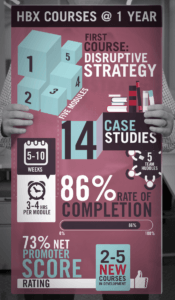

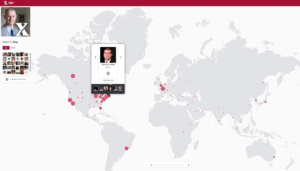
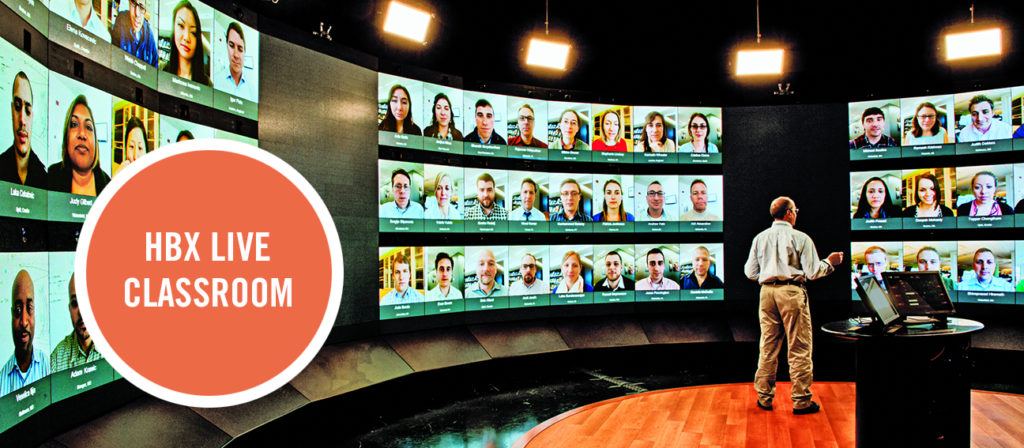
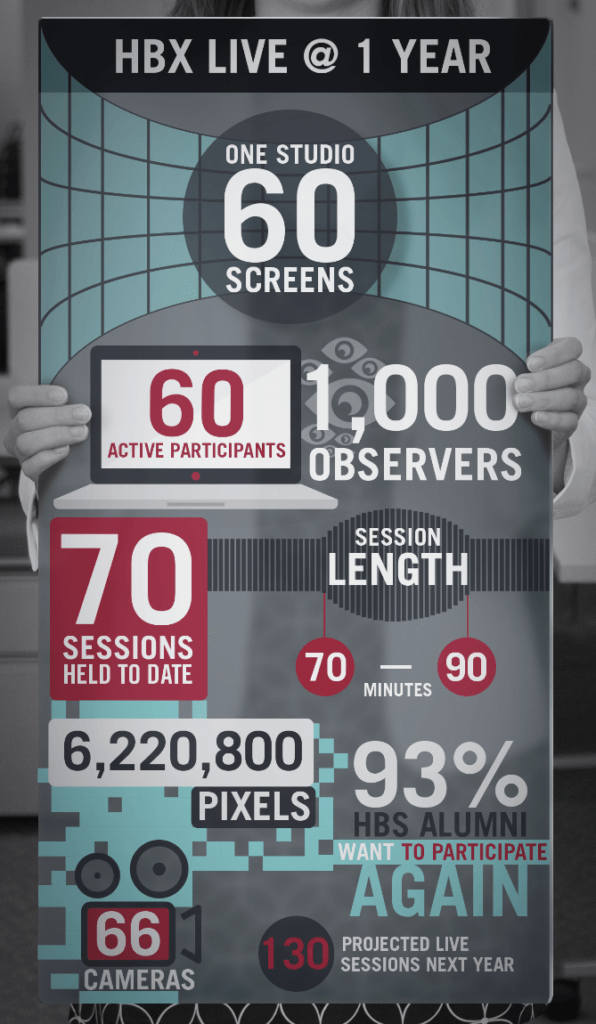
Great post! I was participant of the Core myself and this was an amazing experience indeed! I agree with your suggestions regarding future potential, and would like to stress the need for the HBX to spread out more so that full time students can take advantage of it. Having such an amazing modern technology literally on campus makes me wonder why we have not been exposed to it yet in some shape. Could this be used to run interactive TOM simulations and FIELD global immersion? Can we speak to our case heroes, who cannot make it to campus, with the help of HBX?
I am a huge fan of HBX, but the thought of developing an online MBA scares me. I truly do not think you can get the experience we are getting online. A huge part of getting an MBA is learning how to interact with others that are different than you and getting exposure to different management styles so you can decide what yours will be. I’m not sure you can achieve that online. I wonder if there’s a way to incorporate negotiations or group work into the curriculum via online cameras to get students from different parts of the world engaging with each other. That might be a way to incorporate the invaluable group work we get here at HBS.
Angelica, I like your post and love your title!
I believe all industries are exposed to the perils and opportunities digitization offers, and the education industry is no different. I agree with the idea that digital learning is one of the ways to go forward, including higher education. To me, e-learning extends beyond online open courses and education programs. Technology can also reshape teaching methods and let students personalize their educational experiences while address the escalating education costs. I consider that digital learning will be especially disruptive for (1) schools that are not in the top in terms of education quality (and here platforms supported by “ivy” universities will monetize the opportunities) and (2) those education programs the value of which is not significantly based on social interactions. I also share Kelly`s view point that it will be rather very difficult for HBX to match the quality and value of a full time good quality MBA experience. I consider that one possible solution to partially mitigate this gap would be to have the HBX students meet for 1-2 weeks every few months, to ensure they can hear and see each other in reality.
Really interesting article, Angelica. I completely agree with you that HBS should integrate technology into the MBA course. Looking at how our world has evolved in the last 100 years, it is shocking that classrooms still look the same today as they did a century ago. I do agree with previous comments, however, that it can be difficult to maintain the same level of quality online. I think a potential mitigant is the hybrid education model, incorporating certain technologies into our classroom without taking over. Another mitigant could be the e-live platform model similar to HBX live, but we need to make sure that control over potential identity fraud and other risks is enhanced.
Angelica, I really enjoyed reading your post.
Before HBS I did HBX CORe and had a very positive experience. In the past I have also studied other online courses such as MIT’s OpenCourseWare and what stuck the most was how engaging the HBX platform is. Before HBX, all my experiences with online education pretty much reduced to watching recorded lectures and me going through the course materials. In HBX, the level of participation and interaction between students is particularly unique, and the fact that content is available at set dates and you have interactive exercises and cold calls and reflections which everyone can read truly set HBX apart.
I agree with you that going forward HBX should try to increase the number of courses offered in the platform, increase the number of live sessions, and combine the MBA program with the HBX platform so that HBX is another channel through which MBA students experience education (not only before school starts). Also, I don’t think HBX and online platforms should replace MBA or universities in general but rather should complement them.
Finally, thinking of education more broadly and more long term, I would like to know your opinion on virtual reality and how it can be leveraged for education purposes. I have heard of some startups starting to explore this idea and I believe it has a huge potential for regions in the world where kids have no access to schools.
Thank you for your post Angelica, it was really interesting! Although I agree with the previous comments in that I do not believe that the overall MBA experience could be replaced by this technology due to the importance of relationship building on-site, I consider the advances made really interesting for other uses. As Andres says, I believe this should technology should also be used to provide access to good education in places where it is now limited if not non-existent.
That being said, technology in education is increasingly a reality and I believe it will be important to understand both its strengths, but also its weaknesses. Is the technology needed to be part of this online classroom readily available to the people that need it? Will HBX be able to face the different technological issues that may arise? And finally, will HBX start competing in recruiting with other schools in Harvard?